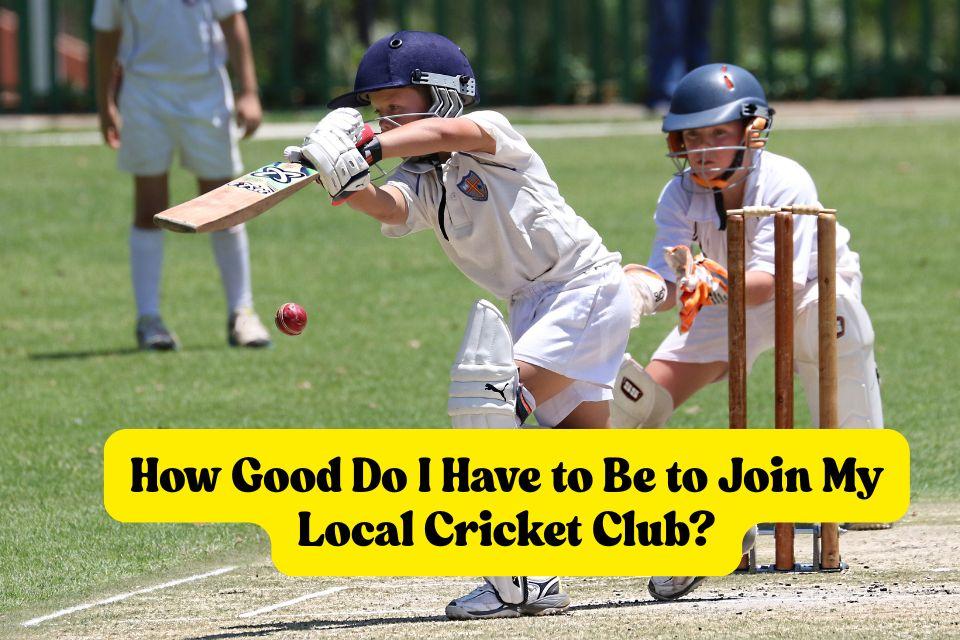


If you’re passionate about cricket and want to take your game to the next level, joining your local cricket club is one of the best moves you can make. But if you’re new or unsure of your skills, a common question arises: How good do I have to be to join my local cricket club?
The good news? Cricket clubs welcome players at all levels from beginners to professionals. Clubs are communities built on growth, learning, and enjoyment. In this detailed guide, we’ll walk you through what clubs expect, how to prepare, what happens after you join, and how you can make the most of your club experience no matter your skill level.
Why Join a Cricket Club?
Joining a club offers far more than just playing matches. It’s a gateway to:
Consistent Training: Access to coaching, structured practice sessions, and expert feedback.
Match Experience: Regular games against competition to test and sharpen your skills.
Social Connection: Build friendships with fellow cricket enthusiasts and be part of a team.
Progression Path: Opportunities to move up competitive ranks as you improve.
Facilities & Resources: Use of nets, grounds, equipment, and sometimes gyms or rehab facilities.
Clubs foster growth for players at every stage, so your current skill level should never hold you back.
What Skill Level Do You Need?
The level of skill expected varies between clubs and teams within those clubs. Larger clubs often field multiple teams: beginners’ teams, intermediate squads, and senior competitive sides. Even smaller clubs welcome new players for development squads or casual games.
Basic Skills Clubs Expect From Newcomers
While perfection isn’t required, having a few fundamental skills will help:
Batting: Ability to hold the bat properly, understand stance, and connect with the ball consistently.
Bowling: Basic grip, run-up, and delivery technique. Accuracy is valued more than pace initially.
Fielding: Ability to catch, throw, and move quickly on the field.
Fitness: Basic level of fitness to handle training and matches.
Remember: Clubs don’t expect beginners to be experts. Enthusiasm and willingness to learn matter more.
How to Assess Your Current Cricket Skills
If you’re unsure about your readiness:
Try a few informal games with friends or at a local park.
Record your batting or bowling to self-assess technique.
Join beginner coaching camps or workshops to get professional feedback.
Visit your local club and ask if you can attend a training session or open day.
This will build confidence and show you areas to improve before officially joining.
Essential Equipment for Joining a Club
Having the right gear helps you start comfortably and safely. You don’t need to invest in top-of-the-line equipment initially, but basics are important.
Basic Equipment List for New Club Members:
Cricket Bat: A size and weight suitable for your age and strength.
Batting Gloves and Pads: For protection while batting.
Helmet: Especially important when playing with leather balls.
Cricket Shoes: Good grip and comfort for fielding and running.
Clothing: Comfortable sportswear or club kit if required.
You can buy cricket equipment online from reliable retailers like SportsGear24x7, which offer starter kits and expert advice tailored for beginners.
Preparing to Join Your Local Cricket Club
Before signing up, take these steps to maximize your experience:
Physical Fitness
Start basic cardio, strength, and flexibility exercises. Cricket requires endurance and quick reflexes.
Learn Cricket Basics
Understand the rules, scoring, and positions. Watch matches, read beginner guides, or take coaching sessions.
Practice Skills
Use nets or local grounds to practice batting, bowling, and fielding. The more comfortable you feel with the basics, the better.
Connect with the Club
Attend open days or trials. Introduce yourself to coaches and players. Ask questions about training schedules and expectations.
What Happens When You Join a Club?
Upon joining, you’ll typically:
Undergo an Assessment: Some clubs assess your skill level to place you in the right team.
Attend Regular Training: Participate in coaching sessions tailored to your level.
Play Matches: Experience competitive games to test your skills under pressure.
Receive Feedback: Coaches will help identify strengths and areas for improvement.
Build Team Relationships: Socialize and develop bonds with teammates for better teamwork.
Remember, progress takes time. Clubs support you throughout your development journey.
Common Concerns Beginners Have
“Will I Be Good Enough?”
Clubs expect beginners to be beginners. Most teams include players learning the game. Your attitude and effort are what truly matter.
“Do I Need Expensive Gear?”
No! Start with affordable, quality basics and upgrade as you grow. Focus on learning first.
“What If I’m Nervous or New to Team Sports?”
Clubs foster supportive environments. Coaches and teammates understand nerves and help you settle in.
Tips for Making the Most of Your Club Experience
Be Consistent: Attend trainings and matches regularly to build skill and trust.
Listen & Learn: Take coaching advice seriously and ask questions.
Practice Outside Club: Work on your skills in your free time to accelerate improvement.
Stay Positive: Cricket is a team sport — support teammates and celebrate progress.
Set Goals: Track your improvement and aim for milestones.
Final Thoughts
You don’t need to be an expert to join your local cricket club — just a passion for the game and a willingness to learn. Clubs are built to help players develop, compete, and enjoy cricket no matter their starting point.
If you need quality gear to get started, remember you can buy cricket equipment online at SportsGear24x7 — trusted by players at all levels.
So lace up your shoes, grab your bat, and take that exciting first step into the world of cricket with your local club!